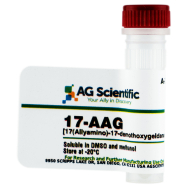Strategies to induce p53 activation in wtp53-retaining tumors carry high potential in cancer therapy. Nutlin, a potent highly selective MDM2 inhibitor, induces non-genotoxic p53 activation. Although Nutlin shows promise in promoting cell death in hematopoietic malignancies, a major roadblock is that most solid cancers do not undergo apoptosis but merely reversible growth arrest. p53 inhibition by unopposed MDMX is one major cause for apoptosis resistance to Nutlin. The Hsp90 chaperone is ubiquitously activated in cancer cells and supports oncogenic survival pathways, many of which antagonize p53. The Hsp90 inhibitor 17-allylamino-17-demethoxygeldanamycin (17AAG) is known to induce p53-dependent apoptosis. We show here that in multiple difficult-to-kill solid tumor cells 17AAG modulates several critical components that synergize with Nutlin-activated p53 signaling to convert Nutlin's transient cytostatic response into a cytotoxic killing response in vitro and in xenografts. Combined with Nutlin, 17AAG destabilizes MDMX, reduces MDM2, induces PUMA and inhibits oncogenic survival pathways, such as PI3K/AKT, which counteract p53 signaling at multiple levels. Mechanistically, 17AAG interferes with the repressive MDMX “p53 axis by inducing robust MDMX degradation, thereby markedly increasing p53 transcription compared with Nutlin alone. To our knowledge Nutlin+17AAG represents the first effective pharmacologic knockdown of MDMX. Our study identifies 17AAG as a promising synthetic lethal partner for a more efficient Nutlin-based therapy.
Strategies to induce p53 activation in wtp53-retaining tumors carry high potential in cancer therapy. Nutlin, a potent highly selective MDM2 inhibitor, induces non-genotoxic p53 activation. Although Nutlin shows promise in promoting cell death in hematopoietic malignancies, a major roadblock is that most solid cancers do not undergo apoptosis but merely reversible growth arrest. p53 inhibition by unopposed MDMX is one major cause for apoptosis resistance to Nutlin. The Hsp90 chaperone is ubiquitously activated in cancer cells and supports oncogenic survival pathways, many of which antagonize p53. The Hsp90 inhibitor 17-allylamino-17-demethoxygeldanamycin (17AAG) is known to induce p53-dependent apoptosis. We show here that in multiple difficult-to-kill solid tumor cells 17AAG modulates several critical components that synergize with Nutlin-activated p53 signaling to convert Nutlin's transient cytostatic response into a cytotoxic killing response in vitro and in xenografts. Combined with Nutlin, 17AAG destabilizes MDMX, reduces MDM2, induces PUMA and inhibits oncogenic survival pathways, such as PI3K/AKT, which counteract p53 signaling at multiple levels. Mechanistically, 17AAG interferes with the repressive MDMX “p53 axis by inducing robust MDMX degradation, thereby markedly increasing p53 transcription compared with Nutlin alone. To our knowledge Nutlin+17AAG represents the first effective pharmacologic knockdown of MDMX. Our study identifies 17AAG as a promising synthetic lethal partner for a more efficient Nutlin-based therapy. 17AAG enhances wtp53 signaling by stabilizing p53, destabilizing MDMX and disrupting p53 MDMX interaction The Hsp90 chaperone machinery is highly and almost ubiquitously activated specifically in cancer cells and p53 is an important client protein. The aberrant conformation of mutant p53 proteins requires permanent heat-shock support; thus mutant p53 is stably engaged in Hsp90 complexes to prevent aggregation.For wtp53, Hsp90 also fulfills an important role by promoting its proper conformation through transient interaction. Importantly, inhibition of Hsp90 by the highly specific geldanamycin-derived Hsp90 inhibitor 17AAG or 17-dimethylaminoethylamino-17-demethoxy-geldanamycin (17DMAG) was reported to increase wtp53 protein in cancer cells and induce apoptosis in a wtp53-dependent manner in both mouse embryo fibroblasts and in allotransplanted primary medulloblastomas in vivo. We therefore first examined how 17AAG affects wtp53 and its negative regulators MDMX and MDM2. A panel of randomly selected wtp53 human cancer cell lines from solid tumors (RKO colorectal, MCF7 breast, AGS gastric adenocarcinoma and U2OS osteosarcoma) were treated with 17AAG to assess protein levels. As expected, in all four cell lines 17AAG increased p53 significantly within 4–8 h. Surprisingly, 17AAG dramatically decreased the level of MDMX protein in all the lines tested. Concomitant downregulation of MDM2 was observed in RKO and AGS, whereas p21 protein was upregulated in all the lines.Sources: A V Vaseva, A R Yallowitz, N D Marchenko, S Xu and U M Moll
